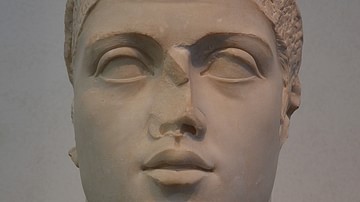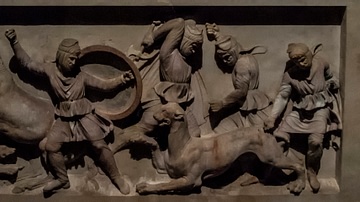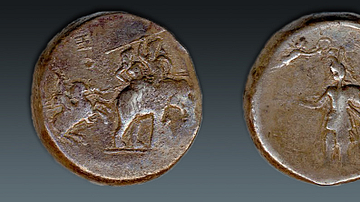Search
Did you mean: Lysander?
Search Results

Image
Alexander Severus
Portrait of Roman Emperor Alexander Severus (reign: 222 – 235 CE), from Ostia Antica. (Palazzo Massimo alle Terme, Rome)

Image
Alexander the Great and Bucephalus
Alexander the Great on Bucephalus, bronze equestrian monument by Evangelos Moustakas, photograph by Franco R. Batista Garcia, Thessaloniki, 10 September 2025. Following the assassination of Philip II of Macedon in October 336 BCE, his son...

Image
Alexander the Great
Marble head of Alexander the Great, found in the Kerameikos in Athens, c. 300 BCE. Alexander wears the lion’s pelt, a common iconographic feature in depictions of the young king on coins, which hints at his descent from the mythical hero...

Image
Alexander the Great (Artistic Facial Reconstruction)
A photorealistic representation of Alexander the Great (r. 336-323 BCE) as he may have appeared in life. This reconstruction is based on archaeological evidence including busts, coin portraits and statuary, as well as descriptions of Alexander...

Image
Alexander the Great & Bucephalus Mosaic
Detail of the Alexander Mosaic, representing Alexander the Great on his horse Bucephalus, during the battle of Issus.

Image
Alexander the Great in Combat
An artistic impression of Alexander the Great in combat (played by Colin Farrell), from the motion picture Alexander (2004), directed by Oliver Stone.

Image
Alexander Sarcophagus
This is a side panel of the Alexander Sarcophagus, a stone sarcophagus adorned with bas-relief carvings of Alexander the Great from the 4th century BCE. Discovered in Sidon, Lebanon and residing in the Istanbul Archaeology Museum today.

Image
Alexander & Porus
A rare silver medallion decadrachm depicting Alexander the Great on horseback attacking King Porus on elephant; the reverse shows the Macedonian king holding a thunderbolt while being wreathed by Nike Babylon (?), c. 325/4-322/1 BCE The...

Collection
Between Alexander & Rome: The Hellenistic Period
The Hellenistic Period refers to the time between the death of Alexander the Great (323 BCE) and the rise of the Roman Empire (32 BCE) in which Greek culture spread throughout the Mediterranean and Near East. Beginning with a series of conflicts...

Image
Alexander the Great, Bronze Head
Head of Alexander the Great from a smaller than life-size statue, goldleaf on bronze, 2nd century CE. (Palazzo Massimo, Rome).